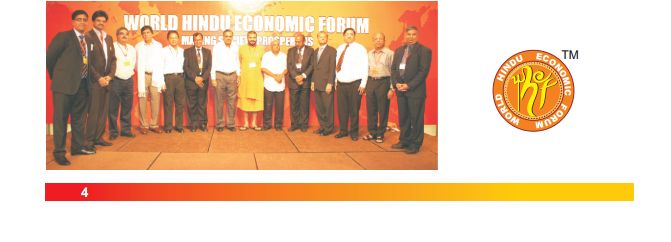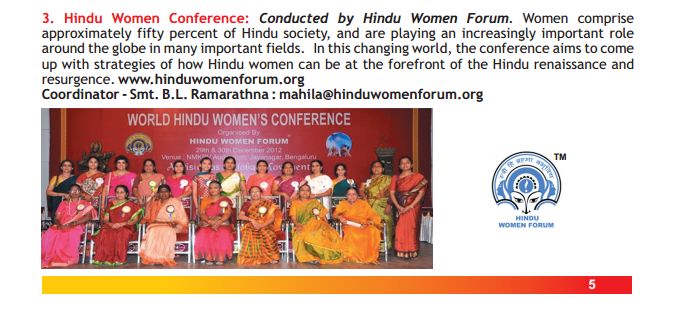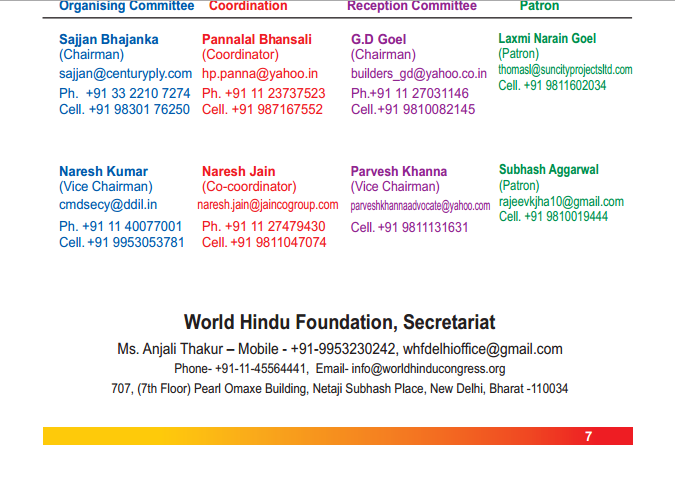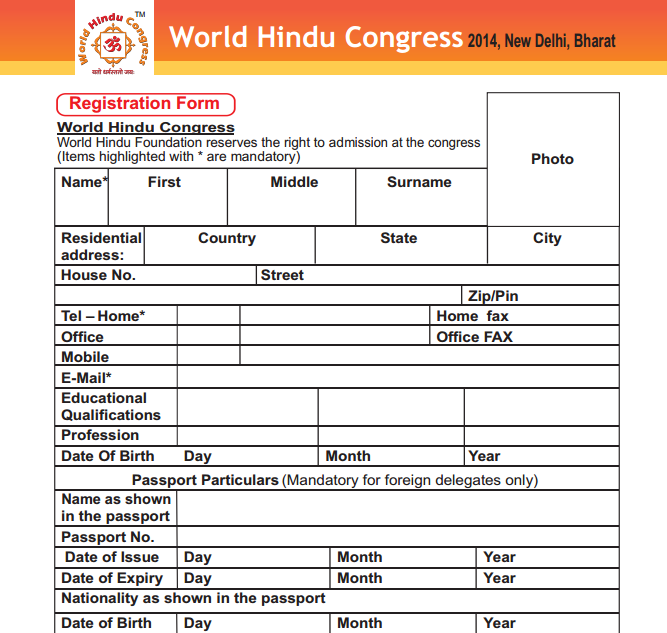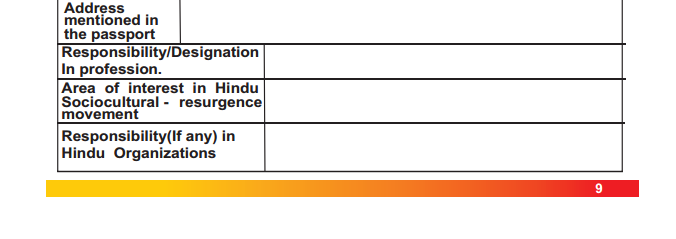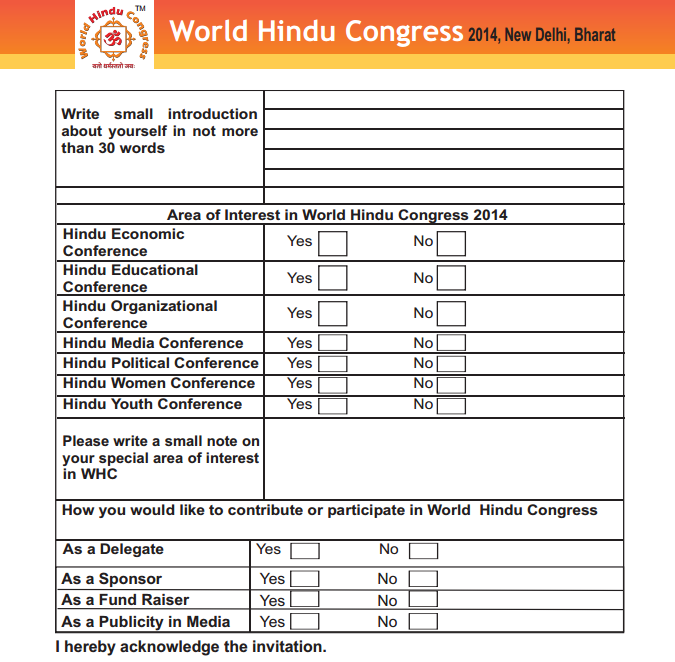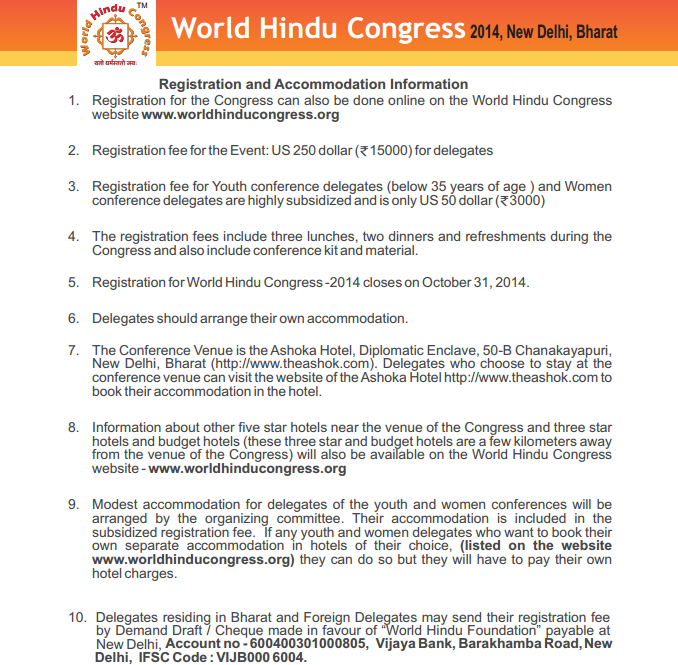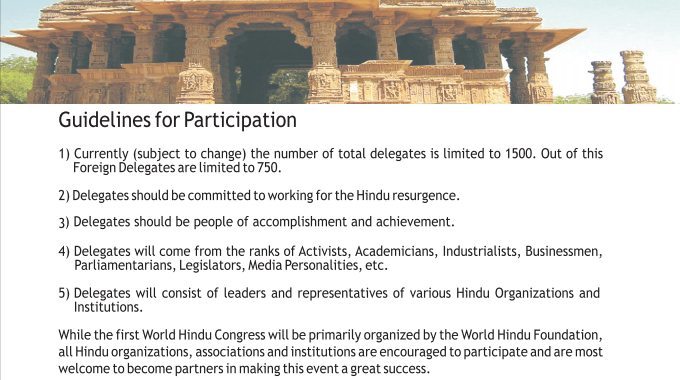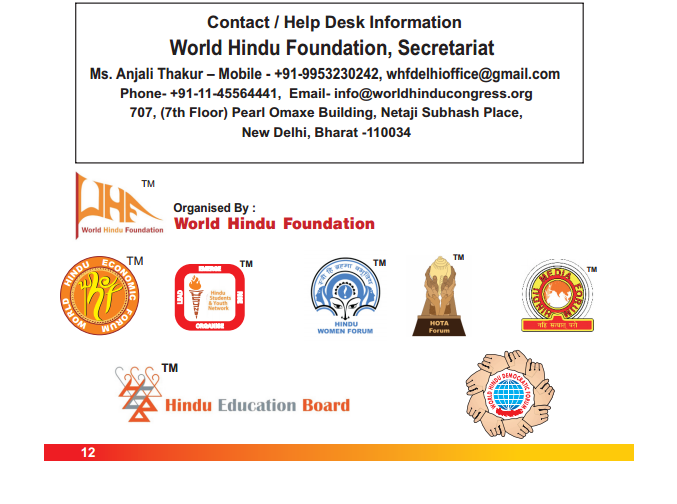An Instrument for Organizing the Global Hindu Community
At the end of World War II, the world witnessed the rapid emergence of newly independent
countries unshackling themselves from the clutches of weakening colonial powers. Bharat was
in the forefront of countries in obtaining independence to chart its own destiny. Hindus in Bharat
as well as those throughout the world saw these changes and the opportunities that arose with
great expectations.
Bharat finally obtained its independence on August 15, 1947, although this independence came
after a painful and horrific partition of Hindus’ historic and spiritual homeland. During the
violent cataclysmic event of the partition of the historic land, the world witnessed one of the
largest migrations and mass slaughter of people ever seen in recorded history, with the Hindus
bearing the brunt of the killing and forcible displacement. The overwhelmingly majority of the
Hindu population was driven out of West and East Pakistan (now Bangladesh).
It was through this ultimate ordeal under which Hindus finally obtained their independence
after one thousand years of brutal occupation by hostile, genocidal, non-Hindu forces. After
partition, Hindus of an independent Bharat and those Hindus residing outside Bharat hoped to
build their future. Hindus had suffered humiliation and impoverishment for a thousand years of
hostile anti-Hindu rulers, but had survived. Hence, with great expectations and possessed with
tremendous potential, Hindus looked to the future.
However, even in an independent Bharat, Hindu interests were compromised due to various
factors. Along with the problems the Hindus have to deal within Bharat, Hindus all over the
world are facing serious threats to their right to exist. Problems were particularly acute in
Pakistan and Bangladesh, where Hindus suffer numerous instances of mass genocide, forcible
displacement and conversion. Hindus living in other parts of the world such as the Caribbean,
Africa, Sri Lanka, Malaysia, Indonesia, Fiji etc were facing discrimination and humiliation
largely on account of their Hindu identity. There was neither a government nor an organization
world wide to effectively look after the interests of Hindus.
It was in the context of this background, Hindus from different backgrounds had decided to form
an organization to strengthen Hindu society throughout the world. Prominent and respected
Hindu leaders such as Swami Chinmayanand Saraswati, Shri M. S. Golwalkar, and Shri Shivram
Shankar Apte, undertook the initiative supported by Sardar Master Tara Singh, Jain Muni Sushil
Kumar and Rinpoche Kushok Bakula called an unprecedented meeting of social, spiritual,
cultural and political Hindu leaders and chiefs of many different sections (sampradayas) of
Hindu society such as, but not limited to, Shaiva, Vaishnava, Veera Shaiva, Jain, Buddhist, Sikh,
Arya Samaj, and others at the Sandeepani Sadhanalaya, Powai, Mumbai.
Over forty important Hindu spiritual and civic leaders took part in this meeting and held lengthy
deliberations and discussions to formulate a way forward. Several ideas were put forth. The
assembled leaders finally formed the Vishva Hindu Parishad (VHP) on the day of Krishna
Janmashtami (which commemorates the birth of Bhagwan Krishna), on August 29, 1964.
Over the past 49 years, VHP has served Hindu society with great effort by bringing together
Dharmacharyas of all Sampradayas of Hindu Dharma. It has also started a wide range of service
and education projects to serve the less fortunate members of Hindu society.
VHP has played an instrumental role in restoring pride among Hindus about their glorious
heritage and made efforts to unify Hindus across many different lines. The most prominent
example of VHP’s contribution to the Hindu Resurgence was during Sri Ramajanmabhumi
movement, which was the monumental agitation by Hindus demanding the restoration of the
holy site of the birthplace of Bhagwan Rama to Hindu society.
The VHP has been extraordinarily successful in its chosen mission and continues to serve the
Hindu society through seva, and provides a platform for Dharmacharyas to come together.
Major shifts have taken place in the world economy since the late 1960s. There is a market
driven world order and Hindus have kept up with the times by taking advantages of the new
avenues of movement and economic opportunities. Along with the economic opportunities,
Hindus are facing numerous challenges especially in the form of human rights violations, active
discrimination against Hindus, cultural assaults and other forms of existentialist challenges.
Recent developments in Nepal, Sri Lanka, Bhutan, Pakistan, Bangladesh, Indonesia and
Malaysia have shed light on the challenges confronting Hindu society. In Bharat, Hindus continue
to face disadvantage and discrimination vis-a-vis other communities. The responses to any such
challenges are complex and will have to be addressed outside of the current institutional
framework.
Our forefathers have worked hard to nourish and preserve Hindu society. For the most part,
other societies which were ruled by either imperialistic Muslim or Christian forces failed to
retain their native religious traditions and instead were converted to the religions of their
conquerors. Examples of this dynamic can be seen in Iran, Iraq and Central Asia in the aftermath
of being conquered by Muslim Arabs, and also with the whole of Europe rapidly succumbing to
Christianity shortly after being conquered by Christian forces. Hindu society, however, in the
subcontinent valiantly resisted over a period of 1200 years, the attempts by Muslim and
Christian to oppress and convert the Hindu population, with Hindus comprising 75% of the
subcontinent’s population shortly before the horrors of Partition.
Now is the time for the present generation of Hindus to take this valiant legacy forward and to
assume the implied responsibility of shaping and nurturing Hindu unity and organization
throughout the world. This task needs to be undertaken with a single minded focus of rebuilding
the spiritual and material heritage of Hindus.
Currently, Hindus are facing serious challenges and are being attacked from all directions in
many areas of the world such as Malaysia, Indonesia, Sri Lanka, Nepal, Afghanistan, Bhutan,
Africa, the Americas, Europe, Fiji and the Caribbean. The remaining Hindu inhabitants of
Pakistan and Bangladesh are repeatedly subjected to numerous hardships and atrocities. Given
this scenario that confronts Hindus, it is necessary to assemble once again to formulate
effective strategies and solutions as well as mobilizing the means to address these myriad
.
World Hindu Foundation is organizing the first World Hindu Congress on 21-22-23 November 2014
in New Delhi.
Why World Hindu Congress?
Features of the First World Hindu Congress:
After the formation of Vishva Hindu Parishad, the first World Hindu Conference was organized in
1966 at Prayag during the Kumbh Mela. After a gap of 13 years, the second World Hindu
Conference was again organized in 1979 at Prayag, Bharat. Again after a gap of 28 years, the
third conference took place at Prayag in 2007.
Several World Hindu Conferences have been organized in different parts of the world such as the
World Hindu Conference that took place in 1984 and 2003 in Sri Lanka. Additionally, the
European Hindu Conference was held in Denmark in 1985, at The Hague in 1988, and in Frankfurt
in 1992. Additionally, the World Hindu Conference was held in South Africa in 1995, the All Africa
Hindu Conference in Nairobi in 1998, the World Hindu Conference in Trinidad and Tobago in 2000,
Asia-Pacific Conference in Singapore in 1988, World Hindu Conference in 1988 at Nepal. Two
major events of significance – Vision 2000 – in 1993 Washington, Virat Hindu Sammelan in 1989 at
The world’s Hindu society is a billion in population. Now is the time to take the movement for
Hindu solidarity to the next level. The main idea behind the World Hindu Congress is to provide a
global platform for Hindu society to deliberate and formulate solutions to the myriad challenges
being faced by Hindus throughout the world and to devise workable and tangible solutions that
can be implemented.
After the completion of the first World Hindu Congress, subsequent sessions of the World Hindu
Congress would be organized in regular intervals of four years in various areas throughout the
world.
The theme envisioned is the Hindu principle of Sangachchhadhwam Samvadadhwam, which
means ”Step together, Express together”. With the guiding principle and as our inspiration,
there will be several conferences held during the congress:
U.K were also organized.
4
1. Hindu Economic Conference: Conducted by the World Hindu Economic Forum.
The primary goal of this conference is to provide a platform to Hindu businessmen, professionals,
and aspiring entrepreneurs to play an important role in the world economy as well as play a
decisive role in the Hindu renaissance and resurgence. www.wheforum.org
Coordinator – Arun Bajaj : arunbajaj@akbindustries.com







